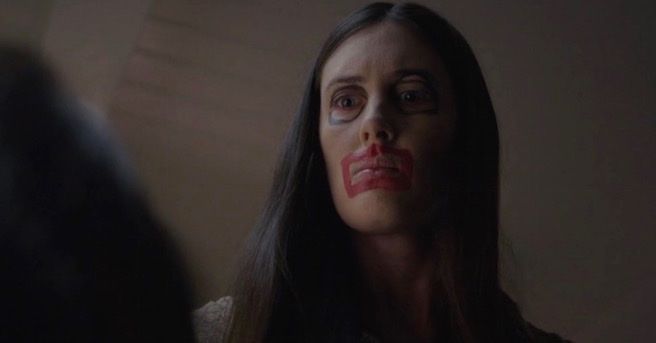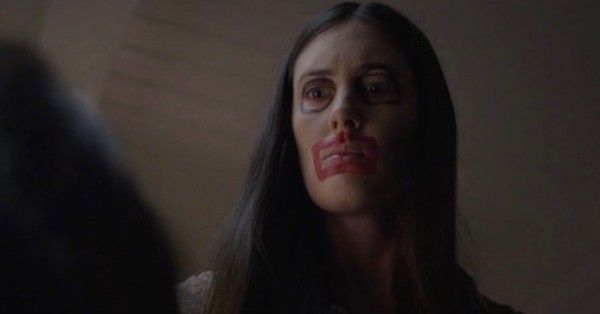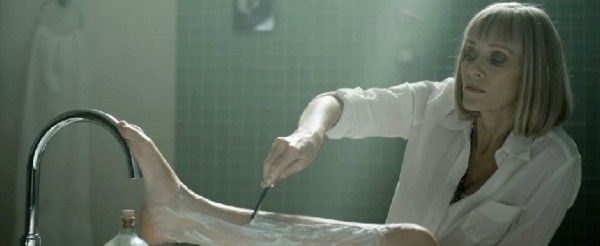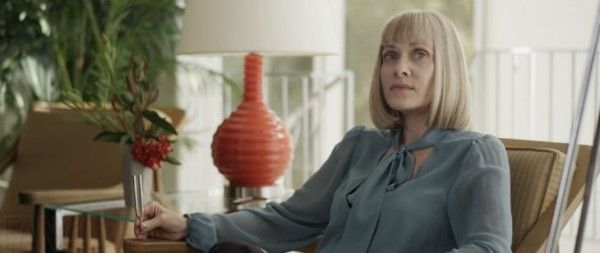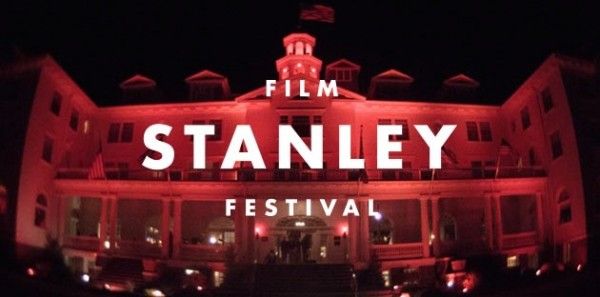While I was at the Stanley Film Festival this past week I had the chance to talk with the cast and crew of Sun Choke. While the busy festival schedule prevented me from being able to see the completed film (something I plan on doing soon), I had seen an early cut of the work and found it quite unique. Writer/director Ben Cresciman has fashioned an intelligent, methodical meditation on nature vs. nurture that manages to scare and shock without relying on traditional horror tropes.
On the last day of the festival I sat down with Cresciman and stars Barbara Crampton, Sarah Hagan, Sara Malakul Lane and producer Peter Nieves to talk about realizing this vision. Check out the interview below (and take a look at the film's trailer here).
Collider: So what’s it like to be premiering this film at Stanley?
BEN CRESCIMAN: Well, you know, it’s interesting. It was so fun the first few days that I kind of forgot I was here premiering a film. I mean, the nerves set in a little bit yesterday, but the community here is so fantastic. The vibe and the energy that everybody has for everything that’s going on... just being here and sharing a love for genre. Stanley was the first place that we sent the new cut to, and all of a sudden we’re in the festival. So not only was that really gratifying for me in terms of the work I had done on, but getting invited to a festival with such a qualified pedigree and having the film be embraced was amazing.
BARBARA CRAMPTON: Yes, they seemed to be engaged in the movie, because they were staring in their seats. It’s not the kind of movie that you’re going to laugh at, or you’re going to have big strong reactions to.
Well not peppered throughout, but I think you have a reaction as a whole.
CRAMPTON: Yes. Well, the first terrible thing that happens to somebody, because a lot of terrible things happen, you know, there was a big outcry starting there. I think the movie’s pretty shocking, and very intense overall and it might leave people a little numb at the end.
CRESCIMAN: Yeah, that was some of the response I heard from people, like ‘it’s going to take a while to digest that.’ It’s a lot to unpack. But all peoples’ responses were, a lot of positivity, but still maybe swirling a little bit in like, ‘What the fuck did I just experience?” But that’s what we wanted to do from the beginning, was put people in that position.
SARAH HAGAN: Yeah, exactly. It leaves people thinking.
None of you have an easy time in this movie, all of you guys have to do some heavy lifting as actors.
CRAMPTON: There’s a certain amount of loneliness and aloneness that I think we all share through the movie, and we’ve talked about that theme a lot. And a feeling of isolation, really in our own minds. Of course Sarah Hagan and I, we’re living in the house, separated, but together. I’m the more controlling caretaker and she’s the one who has to be taken care of. And so we’re isolated with one another, but also operating on two different levels. And it was just the daily challenge showing up for work and working through our scenes. It was challenging for all of us.
HAGAN: Yeah. I know some people can just turn it on and off right away, and I kind of can sometimes, but I think this role specifically was different emotionally for me. It was just demanding, physically and emotionally. And I felt like, at least when I was there in the house and showing up to work every day, I really just needed to concentrate and be in this all time.
SARA MALAKUL LANE: You had to be very focused.
The house and environment of the film are very sterile. Ben, can you talk about how the design and look of the house ties into the theme of the film?
CRESCIMAN: Yeah, absolutely. We picked the house for for a couple of reasons. One, we knew we wanted to be secluded in a geographic sense. You walk down multiple flights of stairs. You’re in this sort of like seven million dollar modern architecture prison, you know? So it worked. That first walk down the stairs for me was like, “Okay, I’m seeing this.” What I also thought was really excellent about the house was, particularly on the main floor, you couldn’t be anywhere without being visible from any other spot on the floor. So I thought it was really interesting to have this girl have grown up in a house where you’re never alone. Like, ever. And then going in and designing the space, we wanted to create an environment that was sort of sterile and hospital-like. I mean, it’s a home, but we didn’t want it to seem warm or lived-in. This is a place where people live, and nothing more, really.
LANE: The house was definitely a main character in the movie. It was such a beautiful house. But the way it was shot and the way it’s portrayed in the movie was like this creepy vortex that if you happen to cross the gate and go in there -- you’re fucked [everyone laughs].
And Peter, how do you shepherd this stuff along as a producer?
PETER NIEVES: You know, I read a lot of scripts and it’s such a good feeling to get one and just know you have to make it. And that was my experience with Sun Choke. It’s hard because this has been our baby for the last two years, and we still have a journey to go on with festivals and distribution, but we cared so much. We spent so much time together. It was a very personal project. It felt different. It’s not exactly an art film, but it felt like that kind of passion was put into it. It never felt like a product.
Was there a decompression period for you guys coming out of this?
HAGAN: It was Christmas. I had one day in LA that I was off and then the next day I flew to Tennessee and had Christmas. But yeah, it was good. And then literally after a week or two, I was like, “Alright, I’m ready. Let’s go. Let’s do another.”
LANE: For me, the last week of filming was kind of fun because I was just walking around Silverlake being blissfully unaware.
CRESCIMAN: Yeah, that’s true, once you were out of the house it was pretty easy for you [laughs]. The only person who had it real rough out of the house was Will Nichol.
LANE: I don’t know if he’s recovered, to be honest.
CRESCIMAN: Maybe not. [What we did to him] was fucking brutal.

